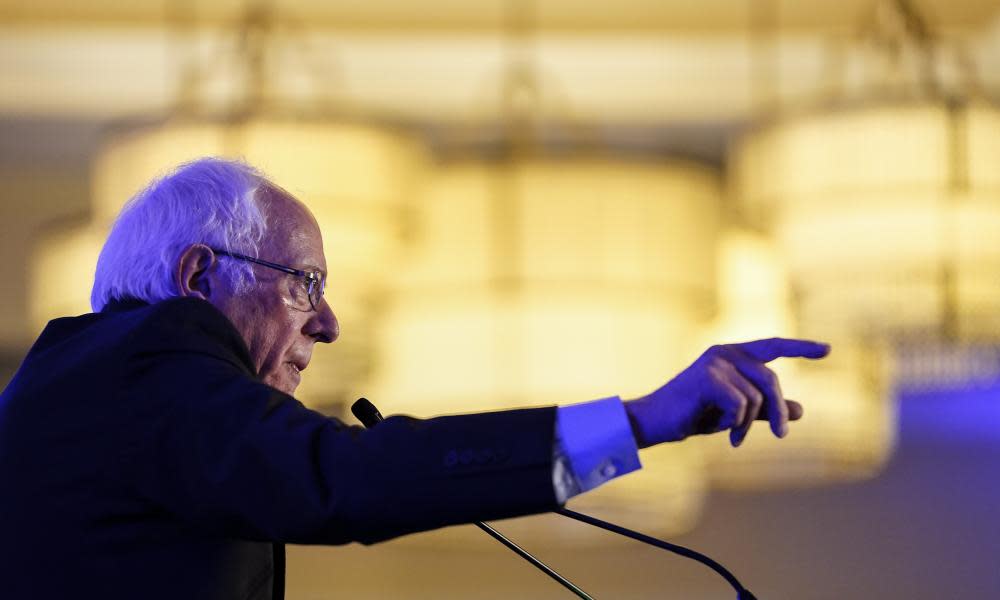Democrats need to take a long, hard look at Bernie Sanders before taking the plunge

Following his win in Nevada and rise in the polls, Bernie Sanders is now the obvious frontrunner to win the Democratic nomination for president. Yet while he certainly occupies the commanding heights of the race, it is far too early to declare him the winner. And given what is at stake in the election against Donald Trump later this year, Democrats need to take one last, hard, dispassionate look before they take the plunge.
The most likely scenario at the moment remains that Sanders will eke out a win and take the nomination, but the race isn’t over yet. A strong showing for Biden in South Carolina this Saturday could reset the media narrative, while Bloomberg’s plans to subject Sanders to the first serious blitz of negative campaigning he has faced could take its toll.
Most significant of all would be if one or more top-tier candidates drop out before Super Tuesday, allowing for the possible consolidation of the anti-Sanders vote. For all of his talk of a monolithic “Democratic establishment” trying to keep him down, Sanders owes much of his success so far to the fragmentation of the opposition. In national polls, roughly seven out of ten Democrats still want someone other than Sanders to be the nominee. If some of his opponents leave the race, someone else – most likely Biden – could still consolidate the anti-Sanders vote.
But while the number of candidates has been one problem for opponents of Sanders, their own sheer weakness has been another. Centrist voters, commentators and “the establishment” may panic about Sanders, but they struggle to coalesce around anyone else for the simple fact that all of the alternatives face their own serious questions about character, record, and electability.
Even given such a flawed field, it is still very risky to assume that Sanders is the best placed to beat Trump. Sanders’ case for electability is based on a simple claim: he may alienate some swing constituencies like the suburban women who powered the “blue wave” in 2018, but he will bring enough new, younger and white voters without college degrees into the Democratic fold to compensate for the loss. Unfortunately, there has been little evidence of this so far in the primary.
While Sanders currently performs well – although not much better than his competitors – in head-to-head polls with Trump, these polls mean very little so far out from the election. And even though he is buoyed by high favorability ratings, these ratings are unlikely to remain so high after he has been subjected to a maelstrom of negative ads from the Republicans and their allied Super Pacs. Voters like Sanders personally, but they dislike socialism and are happy with the current state of the economy by huge margins. In the coming election, the Republican party will ruthlessly caricature Sanders as a socialist threat to the US economy. While they would do the same any other Democratic nominee, it’s easier to make the charge stick when the nominee calls himself a “socialist” who wants a “revolution” – even if he could fairly be considered a mainstream social democrat anywhere else in the Western world.
Faced with these discouraging observations, many supporters of Sanders reply by pointing to Trump’s surprise win in 2016 as proof that the rules of American politics are changing. But one data point – especially based on such an unusual election – is not enough for us to deliver a collective shrug and decide that conversations over “electability” are now completely pointless. If anything, Trump demonstrated in 2016 how tightly the Republican base sticks together even when it is asked to do so in service of a deeply flawed candidate. It is much harder for Democrats to unite their own fractious and fragmented base in the same way, and it is far from clear that Sanders is the best candidate to do it.
Nor is it clear that the anticipated pay-off from a Sanders candidacy justifies the high risk that it entails. His victory would doubtless be an earth-shattering, totemic victory for the progressive movement. The election of a self-described socialist would indeed overturn the conventional wisdom about American politics. Although they want to divorce the two, the very unlikelihood of it happening is precisely what gets Sanders’ supporters so excited about the prospect that it actually will.
But it is not at all clear how Sanders would translate this symbolic victory – which would also drive polarization to new heights – into a progressive agenda which would differ markedly from any of his competitors. There’s no sign yet that he is sparking the sort of enthusiasm necessary for a “revolution”, and most of his signature proposals would likely be dead on arrival even in a Democratic Senate. Sanders might try to reorient U.S. foreign policy, but the “blob” has many ways of fighting back, including alliances with the senators that Sanders needs to enact the domestic agenda which is his real priority. That all of this is due to tragic flaws in the current structure of American politics and governance does not make it any less true.
Given the importance of beating Trump, Democrats need to think long and hard about Sanders’ vulnerabilities before they settle on him as the nominee. It is more correct to see him as another member of a deeply flawed pack than as a surefire winner in November, and the rest of the field deserves one more look. If Sanders is nominated, he will need to break a lifetime’s habit and attempt to pivot to a more centrist position in order to neutralize these vulnerabilities. But most importantly of all, if the primary electorate does ultimately pick Sanders, he deserves party unity in service of the larger goal of defeating Trump. He’s certainly going to need it.
Andrew Gawthorpe is a historian of the United States at Leiden University in The Netherlands

